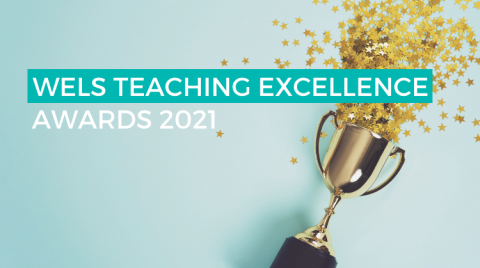WELS Teaching Excellence Awards 2021

Every year the Faculty of Wellbeing, Education and Language Studies recognises students, tutors and projects that have gone above and beyond what is expected of them. In a virtual ceremony that took place yesterday (Tuesday 5 October), WELS Student Awards, WELS Tutor Awards and WELS Teaching Excellence Awards were announced with tributes paid to individuals and project teams who have excelled in supporting others.
The WELS Teaching Excellence Awards seek to recognise outstanding teaching that promotes our students’ success. In 2020 and 2021, many projects and programmes had to adapt rapidly and creatively to challenges posed by pandemic restrictions and the way our colleagues have embraced and boldly addressed these challenges is reflected in three nominations that stood out from the crowd and were presented with awards.
Sarah Stewart and the OU PGCE (Post Graduate Certificate in Education) team, for demonstrating a positive attitude toward students and continually working to overcome obstacles that might subvert learning.
The PGCE is a work-based learning programme and the OU are the sole providers of this employment-based and part-time teacher training provision in Wales. Due to the severe restrictions imposed on schools during the pandemic, the programme team has had to work in a very responsive and agile manner to support student teachers. The team introduced a virtual school experience comprising of a peer-led lesson-planning activity where small groups of students worked together online, and a series of online workshops curated by the PGCE team, involving 12 partner schools.
Evidencing the impact of their adjusted provision, Sarah Stewart, Director of the PGCE Programme in Wales, commented, “Without this virtual teaching experience student teachers would not have been able to complete a statutory part of their training programme. The activity has enabled student teachers to collaborate with other students across Wales enabling a broader perspective and dialogue about their own teaching practices.”
Dr Sylvia Warnecke and Bärbel Brash, for Enhancing students’ employability skills during their study of the Learning Languages with Senior Learners course.
Students on the Learning Languages with Senior Learners course learn how to teach languages for wellbeing, particularly to support older learners and people with dementia. Those learning to teach do not have to be experts and at the heart of this pioneering pedagogy is the notion of learning a new language together, using multisensory approaches that allow every learner to engage at their level.
During the Covid-19 pandemic, the course has provided students with the skills and competence to deliver classes either face-to-face or online when care homes could not receive any external visitors, which helped overcome some of the enforced isolation residents have suffered from.
Participants’ employers commended this programme for inspiring staff and enabling them to provide this unique learning in their care context long-term. Feedback showed that the course had led to a change of mindset with staff being able to develop novel ways of engaging with residents, and residents being empowered through the languages activities to develop their participatory literacy and wellbeing.
Dr Ursula Stickler, Susan Kotschi, Elke StJohn and Jessica Sampurna of the Jena CALLing team, for finding unique and creative ways to connect students to each other.
A visit to the country of the target language is the greatest boost to motivation and fluency for language learners. Level 2 language modules in the School of Languages and Applied Linguistics (LAL) have an integrated residential school in Germany, France or Spain, with an online Alternative Learning Experience (ALE) available for those not able to attend in person.
Jena CALLing is an evaluation project named after the location of the German residential, referencing Computer Assisted Language Learning (CALL) as well as the virtual ‘call out’ to colleagues in Jena for support. The project team initially evaluated the experience of ALE participants compared to those who attended in person. When the Covid pandemic restricted international travel for students, the Jena CALLing team took the opportunity to use feedback on the ALE student experience to further develop the one-week intensive ALE for all students due for a residential study trip.
Reflecting on the success of the new learning model, the team says, “Pedagogic innovation has changed the way students engage with each other. The inclusive nature of the project has helped to fully integrate learners who for various reasons are unable to join a face-to-face residential school.
Where previously students on the ALE could have felt disadvantaged because their personal circumstances made it impossible for them to travel and experience cultural and linguistic immersion, the new format provided an inclusive experience closer to a live visit, enhanced group cohesion, and strengthened the collaborative aspect of their learning."
Congratulations to all the awards winners and we’ll be sharing more details about our 2021 Student and Tutor award winners over the coming months.
Read more about the WELS 2021 Awards, and the students and tutors who are amongst this year’s winners.
Are you already an OU student?
Request your prospectus
Explore our qualifications and courses by requesting one of our prospectuses today.
Request prospectus